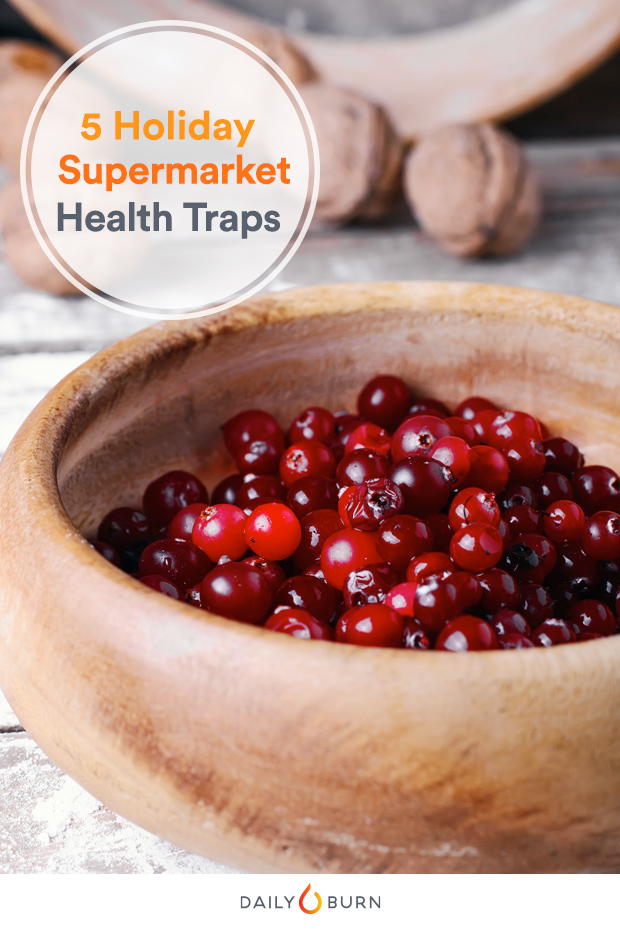
Whipping up a Thanksgiving feast is no easy feat — but taking the time to make your stuffing from scratch might just be worth it (despite the extra dishes). That’s because the store-bought options staring back at you from the grocery shelf might contain some questionable ingredients, according to the Environmental Working Group (EWG), a nonprofit research organization.
“We have so much to do during this time of year that we’re often going for the quick option,” says Jose Aguayo, database research analyst at the EWG. “But more often than not, those quick options are not the best ones out there.” Whether you want to avoid potentially hormone-disrupting chemicals like BPA or just make sure you’re buying the right stuff organic, here’s your guide to healthier Thanksgiving shopping this year.
RELATED: Is Tofurky Actually Worse Than the Real Thing?
5 Thanksgiving Grocery Store No-No’s
1. Prepackaged Stuffing
Boxed stuffing might be pubic enemy #1 when it comes to Thanksgiving. If Aguayo had to choose one thing to tell people to avoid, “I would probably have to stay [boxed] stuffing,” he says. “Simply because they seem to carry the most things in terms of ingredients we want to steer clear of.” Based on data from the EWG’s Food Scores database, most packaged stuffing has added sugars, about a third of them contain the preservative BHA or BHT and many also have partially hydrogenated oils, or trans fat (more on that later). Plus, almost all of the boxed stuffings have some sort of natural or artificial flavor, he adds.
RELATED: How Bad Is Your Food From 1 to 10? Try This Food Calculator
2. Store-Bought Cranberry Sauce
Consider the canned cranberry sauce at your store synonymous with the phrase “sugar bomb.” “Almost all the ones we’ve seen in our database contain 20, 30, even up to 40 percent of your daily sugar intake in added sugar,” Aguayo says. “You eat even one portion of this and you’re pretty much set for the entire day — and of course you’re not just going to eat that!” Save some of your sugar allowance for the pumpkin pie (and apple…and pecan) by making your own cranberry sauce at home — that way you can control how much of the sweet stuff goes into it.
RELATED: How Much Exercise It Takes to Burn Off Thanksgiving Dinner
3. Canned Veggies
That green bean casserole might be a staple at your Thanksgiving table, but you’re better off using fresh beans — or at least taking a good look at where your canned goods are manufactured. “Our main concern with canned items is that they more often than not are lined with BPA…an endocrine disruptor that can mimic a particular hormone in your body and cause havoc in that sense,” Aguayo says. In fact, the FDA banned BPA in baby bottles and children’s cups in 2012. Many companies have ceased using BPA in their cans. Luckily, the EWG put together a list of companies that don’t use the chemical so you can cross reference it before your next stop at the grocery store.
RELATED: The 30 Best Thanksgiving Turkey Trots
4. Partially Hydrogenated Oils
In June 2015, the FDA banned trans fats — aka partially hydrogenated oils — from food products due to serious health concerns. However, that ban won’t go into effect until 2018, meaning there are still a lot of products out there containing the harmful ingredient. “A bunch of gravy items, prepared or boxed will have partially hydrogenated oils and when it comes to pies, quite a few of them also contain partially hydrogenated oils,” Aguayo says. “This is something that come 2018 we’re not going to have to worry about, but at this point we have to look at the label itself and if we see it then that’s something we want to try to avoid.” Here’s how to figure out if trans fats are lurking in your food.
RELATED: 15 Sweet Potato Recipes You’ll Crave Beyond Thanksgiving
5. Pesticides
When it comes to buying organic, consider loading up on apples for your pie, plus potatoes, celery, sweet peppers, kale, cherry tomatoes and the other items on this list. They’re among the most likely pieces of produce to be contaminated with pesticides, according to the EWG’s annual report. If you’re trying to save cash, sweet potatoes can be purchased non-organic — they’re part of the EWG’s Clean 15, along with onions, asparagus, sweet corn and cabbage.
When in doubt, check the Food Scores database while shopping, to see what’s really within the packaging. For more information about Food Scores, click here.
Originally published November 2015. Updated November 2016.
